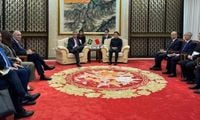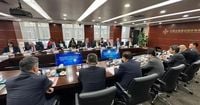On Sunday, April 27, 2025, Rui Costa, the Brazilian Minister of the Civil House, embarked on an official mission to China aimed at attracting significant investments in infrastructure, health, and technology. This visit marks a crucial step in strengthening ties between Brazil and China, with a focus on enhancing mutual benefits through strategic partnerships.
During his time in Beijing, Costa met with representatives from the China Communications Construction Company (CCCC), which is notably responsible for the construction of the Salvador-Itaparica Bridge. This engagement is part of a broader agenda that anticipates 14 highway concession auctions by the end of this year, as the Brazilian government aims to generate approximately US$ 50 billion in investments in the highway sector by 2026.
"We are seeking to materialize and accelerate the change in the level of relations between Brazil and China. This change is a bet by President Lula and Xi Jinping on dialogue and integration to govern the relationship between states. We want closeness and dialogue to promote mutual benefits, and that’s why my visit today comes two weeks before President Lula’s visit," Costa emphasized during his meeting.
The Brazilian delegation is composed of various ministers, state-owned company presidents, and representatives from the National Bank for Economic and Social Development (BNDES). This mission is not just a routine diplomatic engagement; it is a strategic maneuver to lay the groundwork for President Lula's upcoming visit to China in May, where he is expected to finalize investment agreements.
Over the course of four days, Costa's agenda includes meetings with Chinese officials and businesses in key sectors, promoting the Brazilian market and exploring opportunities for collaboration. His initial discussions with Zheng Shanjie, the Minister of the National Development and Reform Commission of China, underscored the importance of these strategic partnerships.
As part of the preparatory activities, Costa highlighted the Brazilian government's commitment to enhancing bilateral relations, stating, "We are looking to make tangible changes in our relationship with China, focusing on mutual benefits through investment and cooperation. This visit is a pivotal moment for our nations to strengthen ties and foster economic growth together."
In addition to the discussions surrounding the Salvador-Itaparica Bridge, Costa presented projects from Brazil’s highway concession portfolio, emphasizing the potential for significant investment in infrastructure development. The planned auctions are expected to attract both domestic and international investors, signaling Brazil's openness to foreign capital and expertise.
The Brazilian delegation's itinerary includes commitments in Beijing until Tuesday, April 29, 2025, followed by meetings in Shanghai on Wednesday, April 30, 2025. In Shanghai, Costa will also meet with former President Dilma Rousseff, who currently leads the New Development Bank (NDB), further highlighting the interconnectedness of Brazil’s political and economic strategies with China.
This visit is Costa's third official mission to China since the beginning of Lula's administration, reflecting the Brazilian government's dedication to fostering strong international relationships. Prior to this trip, Costa had engaged with the Chinese ambassador to Brazil, Zhu Qingqiao, and representatives from various Chinese companies, aiming to expand cooperation in sectors such as energy and transportation.
In a related context, the Brazilian government is also focusing on public health initiatives, with plans to immunize 72,000 indigenous people by May 24, as part of the Indigenous Peoples Vaccination Month program. This mobilization, which began last week, will cover over 962 Brazilian villages, demonstrating the government's commitment to public health and community well-being.
The significance of Costa’s mission cannot be understated; it represents a proactive approach to international diplomacy and economic development. By engaging with China, Brazil is positioning itself as a key player in global infrastructure and health sectors, seeking to leverage Chinese investment to boost its own economic growth.
As discussions unfold, the Brazilian government remains optimistic about the potential outcomes of these negotiations. The expectation is that the groundwork laid by Costa’s visit will pave the way for fruitful agreements during President Lula's visit in May, ultimately benefiting both nations.
In conclusion, Rui Costa's mission to China is a strategic effort to enhance Brazil's international relationships, particularly with a key global player like China. By fostering dialogue and cooperation, Brazil aims to attract investments that will drive infrastructure development and economic growth, setting the stage for a more integrated partnership in the future.





